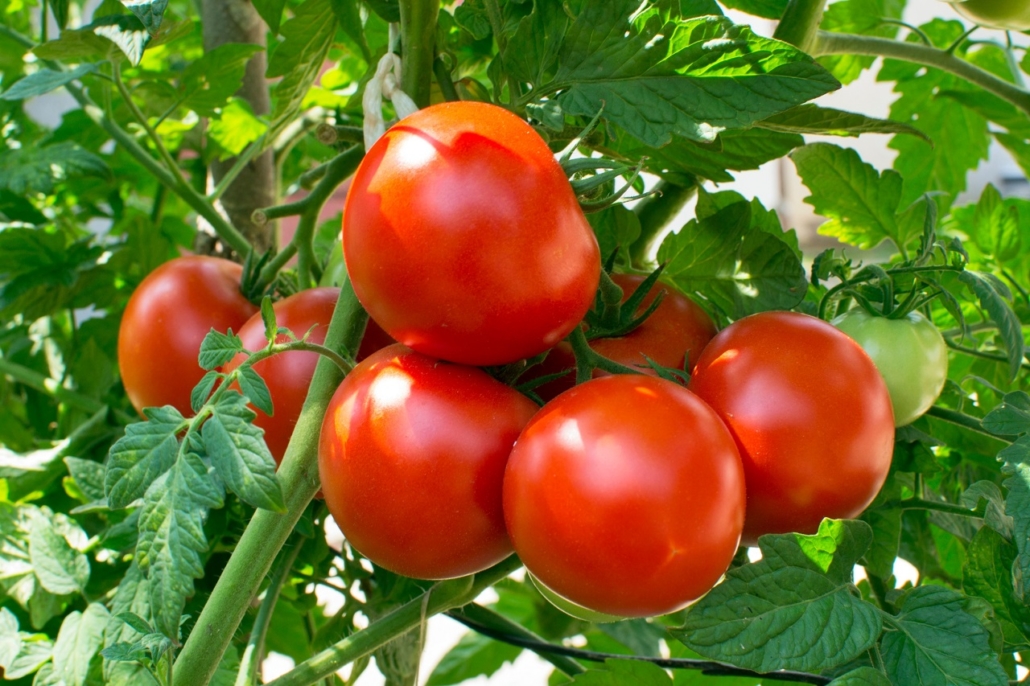GARDEN WORKS: How to plant a garden when seed companies are out-of-stock

Luscious tomatoes. (photo courtesy of Old Farmers Almanac)
 by Emily Cates
by Emily Cates
Are you just itching to plant a garden this year? For many, this is the year, no doubt about it! Faced with COVID-19 uncertainty, droves of folks are inundating seed companies with orders, creating backorders and out-of-stocks to the moon and back. So what’s a gardener-in-waiting to do? Well, read on for a few suggestions. Don’t worry, there’s still hope: The answer might already be in your pantry! Yes, let’s look at some seedy characters in the cupboard that just might help us.
Do you have organic potatoes, dry beans, fresh tomatoes, winter squashes, carrots, or bulbs of garlic and onions kicking around? If so, you could have the start of a garden without even knowing it.
While most commercially-cultivated varieties of garden vegetables like tomatoes are bred for uniformity and keeping qualities as opposed to flavor, it’s still possible to grow something from them — even if the results are not as good as their parent plant. Oftentimes seed saved from a hybrid cultivar will produce inferior offspring, but this can be avoided if the parent plant is an open-pollinated variety that didn’t cross with another cultivar.
The chances of having seeds that are open pollinated, true-to-type, and adapted for our area are increased if the veggie was locally grown. That squash you bought from the farmers’ market last fall? It might be kinda mushy now, but you can try planting the seeds after the frost in nice rich soil, or in a compost or manure pile. If the farmer and her neighbors only grew buttercup squash, for example, then the seeds should grow up into delicious buttercups.
The problems with hybrids and cross-pollination are nonexistent with clones. Clones, by this definition, are plants propagated by separating and planting individual pieces of plant material that grow up into individual plants. Think garlic. Or potato, where you can just go ahead and plant a whole tuber that will grow up into a potato plant which produces several potatoes. I like to plant my spuds this way, especially the small ones. Large potatoes with lots of eyes can be divided into pieces with a few eyes per section. Ones that have begun to sprout are desirable, and green areas are fine. Just make sure they look healthy and aren’t treated with sprout-inhibitors notoriously applied to supermarket spuds.
I have heard of folks replanting carrot and other root tops to start a new plant, but honestly, I’ve never tried this. It would be a good way to promote flowering of the plant and produce seeds for saving, provided the guidelines for open pollination and true-to-types are followed.
We’ve all had the fortune of onions deciding to sprout behind our backs. Instead of chucking them, why not plant them and harvest their “scallions” from the garden?
What about beans? Surely you have a jar of dried beans lurking somewhere, waiting patiently for an apocalypse to compel someone to notice them. Now is the time!
Also, those organic wheat berries you planned on sprouting can also be sowed, exponentially increasing their amount as their plants mature and produce grains. Wheat straw is a good mulch—bonus!
If there’s any doubt of the viability of the seed, a few seeds can be folded into a wet paper towel and kept warm and moist for several days up to a couple of weeks and watched for signs of sprouting.
Well, I hope these ideas are helpful. If you have any you’d like to share, we would love to hear from you! Thanks for reading, enjoy your garden.
Emily Cates is a master gardener living in China and can be reached by email at EmilyCates@townline.org.
Responsible journalism is hard work!
It is also expensive!
If you enjoy reading The Town Line and the good news we bring you each week, would you consider a donation to help us continue the work we’re doing?
The Town Line is a 501(c)(3) nonprofit private foundation, and all donations are tax deductible under the Internal Revenue Service code.
To help, please visit our online donation page or mail a check payable to The Town Line, PO Box 89, South China, ME 04358. Your contribution is appreciated!


Leave a Reply
Want to join the discussion?Feel free to contribute!